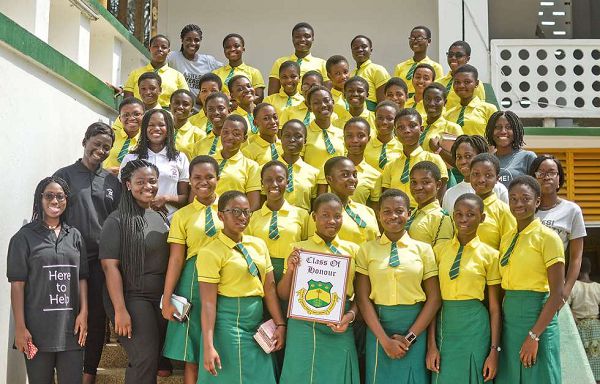
Grammar education good, practical better
Wesley Girls High School (WGHS) in Cape Coast has done it again! This time, the students took four of the six prizes presented by the West African Examinations Council (WAEC) for the 2019 Distinction Awards. The two remaining awards went to Yaa Asantewaa Girls Senior High School and Saint Augustine’s College.
The students who made their schools, parents and Ghana proud are Ms Wilhermina Opoku from WGHS, who was adjudged the Overall Best in the West Africa Senior School Certificate Examination (WASSCE); Ms Sarpong Brago Afrifa of Yaa Asantewaa Girls Senior High School in Kumasi; Ms Imelda Naa Ayorkor Adjei of WGHS; Ms Davina Seyram Gbedy of WGHS and Mr Denis Acquah of Saint Augustine’s College.
Advertisement
The Daily Graphic is delighted to note that by their performance, Ms Opoku and Ms Afrifa also placed second and third, respectively, at the West Africa level and will be joining other candidates from the subregion to receive additional awards from WAEC.
We are elated that in Ghana, the many years of affirmative action have had positive outcomes as more females are found in all levels of decision making. We have some of the best female medical doctors, entrepreneurs and industrialists, CEOs and administrators, media practitioners, educationists, peace keepers, engineers, among many others.
Certainly, we agree and are guided by Dr James Kwegyir Aggrey’s admonition that, “when you educate a man you educate an individual and when you educate a woman you educate a nation”, but our only prayer is that as the country becomes occupied with the affirmative action agenda, we will not overlook the needs of the boy child.
The Daily Graphic is also gladdened because three females have taken awards on a day that Ghana joined the world to mark International Women’s Day, with a call for equality, building smart and innovating for change.
But we have a worry about the grammar type of education that we seem to embrace with glee.
Recently, winners of the National Maths and Science Quiz, who had mesmerised the Ghanaian society with their intelligence and command over these two attractive areas of study, found themselves wanting when they came face to face with the practical aspect of the areas at an international competition.
Industry has also had cause to complain about the inability of graduates from our institutions to translate the theories they learn at school into practical activities. In fact, the conclusion and the common refrain from industry is that our educational institutions are teaching disciplines that have no bearing on society and the place of work.
As a country, we need to sit back and do soul-searching while reviewing our curriculum, vis-à-vis tailoring theories to practical activities so that we can make our education more relevant to our lives.
We reason that it is not enough to have the ability to recall facts; that is only one aspect of the cognitive domain of learning. There are other areas of the cognitive domain that our students must develop – the ability to create, evaluate, analyse, apply what we learn and comprehend, in addition to the affective and psychomotor domains.
The Daily Graphic thinks there should be an affirmative action too towards TVET. Pure science and maths-based subjects must be incorporated into TVET so that our technical and vocational institutions will have a raised image to attract some of the best students.
It is only by this that we can practicalise what we learn theoretically to become employable and make the many awards we receive more meaningful and actively and adequately impact our living.



